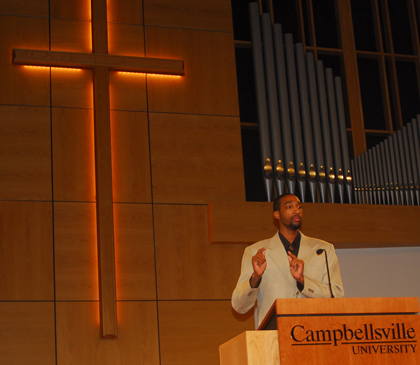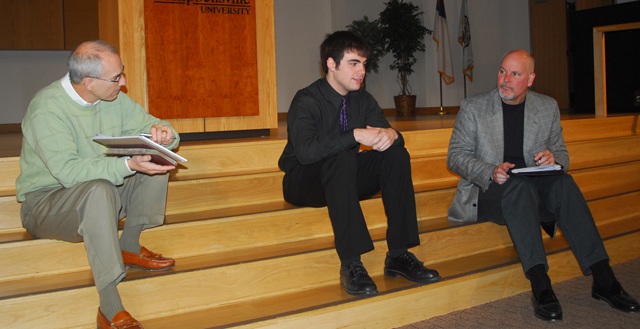For Immediate Release
By Joan C. McKinney, news and publications coordinator
CAMPBELLSVILLE, Ky. – Andre Morton wore a beige suit, black shirt and shiny black shoes, and he was ready to preach the gospel.
Morton, of Vine Grove, Ky., was one of a class of upperclassmen who recently participated in a theology class (Ministry of Proclamation) that prepared students on the correct way to prepare and deliver sermons.
“We were created to bring God’s glory to his name. We serve a loving, faithful God,” Morton said in a soft voice. “There is power in God and Jesus’ name. We are called to serve.”
 Morton, after delivering his 15-18-minute sermon, was called back on the stage at Ransdell Chapel where Dr. Scott Wigginton, associate professor of pastoral ministries and counseling, and Dr. John Hurtgen, dean of the School of Theology, were among those who gave feedback to Morton.
Morton, after delivering his 15-18-minute sermon, was called back on the stage at Ransdell Chapel where Dr. Scott Wigginton, associate professor of pastoral ministries and counseling, and Dr. John Hurtgen, dean of the School of Theology, were among those who gave feedback to Morton.
Wigginton said the preachers are graded on content, which includes: clarity of the Proposition or the Big Idea, giving evidence of careful biblical exegesis, the sermon fitting the text, context and genre of the passage being addressed, illustrations fitting the points being made, and specific applications.
The students are also graded on structure including: introducing the Big Idea and arresting attention, main points being and proportional to the message and the conclusion being clear and purposeful even as it summarizes and challenges.
Andre Morton of Vine Grove, Ky., preaches at Ransdell Chapel. (Campbellsville University Photo by Joan C. McKinney)
Their delivery is also graded as to: appropriate dress andgrooming, articulation and volume, vocal variety, eye contact, use of the Bible and notes, lack of distracting mannerisms and verbal clutter (uh, umm, etc.), minimizing pacing and swaying and appropriate posture.
The class is taught every two years for upperclassmen.
The students received various comments such as: “Your content is your strongest suit,” “That illustration seemed a little flat,” “You’re doing an awesome job,” and “Very strong delivery.”
Wigginton urged the students to make their introductions stronger and to consider making contextual commentary while reading scripture. He told the students to carefully craft their sermons – for example, what is delivered in an African-American church is often delivered differently in a Caucasian church.
Trask Murphy from Madisonville, Ky. was dressed in all black with a purple tie. He delivered his sermon with some funny moments from when his father used a Diet Pepsi can as a spittoon. He said he looks at Diet Pepsi cans differently now. “You can look at things one way and not tell the difference,” he said, “but people may look one way outside and another on the inside.”
 Murphy walked back and forth with his hands in his pockets while he talked about hypocrisy and said, “It’s one thing to not obey the commandments but it’s another thing if you claim you do.”
Murphy walked back and forth with his hands in his pockets while he talked about hypocrisy and said, “It’s one thing to not obey the commandments but it’s another thing if you claim you do.”
Murphy asked “Are you who you are portraying or not?” He said, “You can trick everybody, but if you have a cold, dead heart that doesn’t beat Jesus, it doesn’t matter. Jesus died on the cross for our sins.”
Trask Murphy of Madisonville, Ky., and professors, Dr. John Hurtgen, far left, and Dr. Scott Wigginton, right, discuss his sermon after delivery. (Campbellsville University Photo by Joan C. McKinney)
Wigginton told Murphy his sermon had a “good story that led us along.” He encouraged him, saying, “Jesus was in that sermon all the way.”
Wigginton advised the students that having a clean consistent message throughout their sermons is important, and that they need to lead listeners to long to know more about what the preacher is saying.
They were told the use of “we” statements was good so as to “get in the boat with” their congregation.
Wigginton told the students they each had to find their personal style as they delivered their sermons. It was also suggested to the students to use more reading of the scripture within the sermon to help interpret the scripture they are preaching.
Wigginton said the students each get two sermons to deliver throughout the class so they use peer and professor critique to perform better in each one.
Evaluators included Wigginton, Dr. John Hurtgen, dean of the CU School of Theology; the Rev. Jamie Bennett, pastor of Green River Memorial Baptist Church and CU alumnus; Dr. Skip Alexander, pastor of Campbellsville Baptist Church and member of the CU Board of Trustees; the Rev. Dave Walters, pastor of Lowell Avenue Baptist Church and vice president for admissions and student services at CU; Ed Pavy, director of campus ministries at CU; the Rev. John Chowning, pastor of Saloma Baptist Church and vice president for church and external relations and executive assistant to the president at CU; and the Rev. Al Hardy, pastor of Good Hope Baptist Church and dean of academic support at CU.
The class was taught in the fall semester for 2009-10. Students were encouraged to participate in the first annual Academy of Preachers held in January 2010 at St. Matthews Baptist Church. According to Dr. Dwight Moody, founder and executive director, Campbellsville University had the largest number of students participating in the event of any school in the country.
Campbellsville University is a private, comprehensive institution located in South Central Kentucky. Founded in 1906, Campbellsville University is affiliated with the Kentucky Baptist Convention and has an enrollment of 3,006 students who represent 97 Kentucky counties, 30 states and 37 foreign nations. Listed in U.S.News & World Report’s 2010 “America’s Best Colleges,” CU is ranked 23rd in “Best Baccalaureate Colleges” in the South, tied for fifth in “most international students” and fourth in “up-and-coming” schools in baccalaureate colleges in the South. CU has been ranked 17 consecutive years with U.S.News & World Report. The university has also been named to America’s Best Christian Colleges® and to G.I. Jobs magazine as a Military Friendly School. Campbellsville University is located 82 miles southwest of Lexington, Ky., and 80 miles southeast of Louisville, Ky. Dr. Michael V. Carter is in his 11th year as president.
